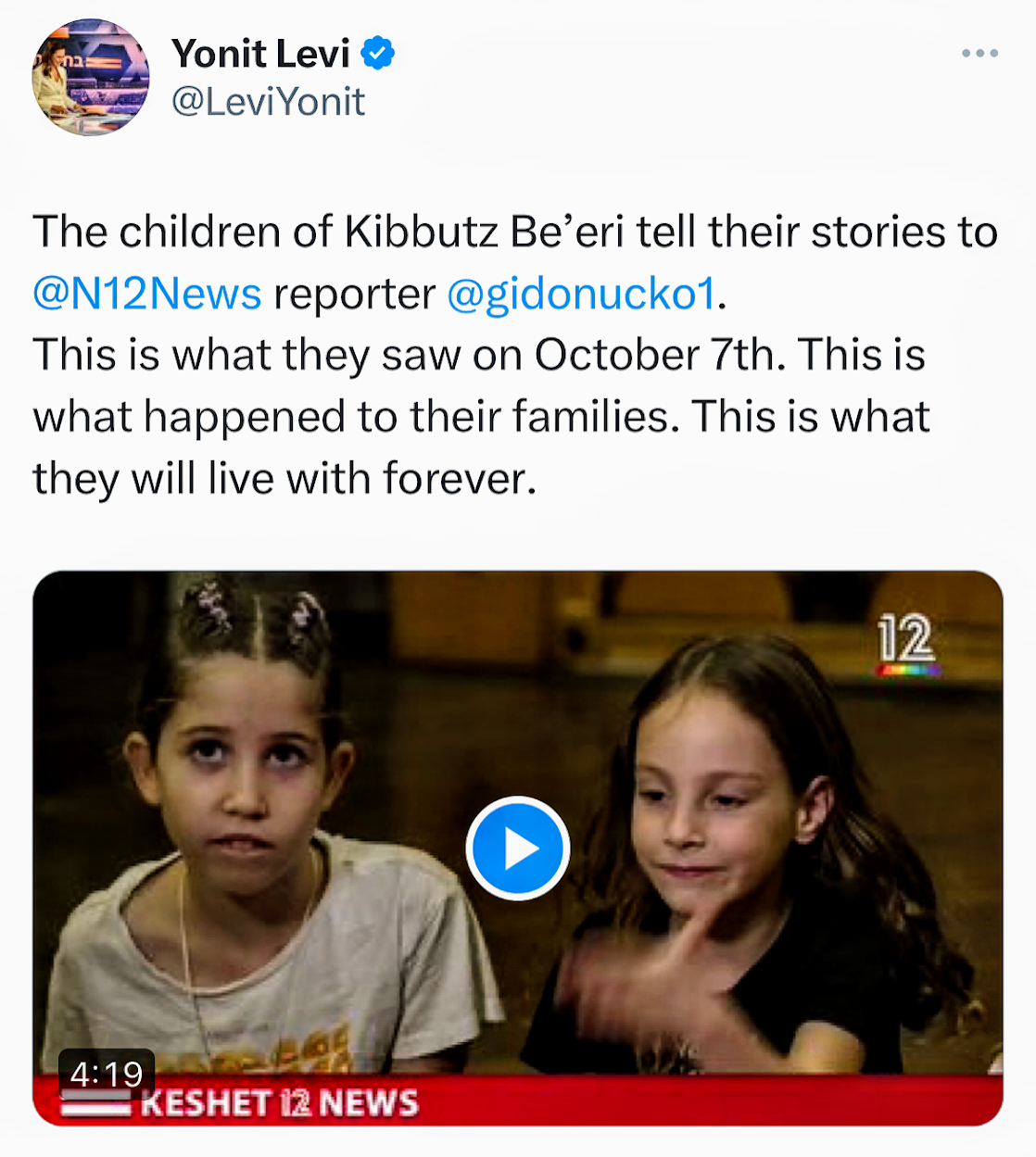Bring Them Home: A Broadway Prayer
This lovely rendition echoes a version of the same song done by the Israel Opera just after Oct. 7. This one is really important, because it places Broadway - an extremely progressive place - squarely on the right side of history with regard to the devastation that was inflicted on Israel by Hamas on Oct. 7 and the capture of 240 hostages. |
|
Going to the Rally in DC? Be a Stringer for TBE!
Mark your place in history. Send me photos, short essays or anecdotes from the march. Email your fresh impressions to rabbi@tbe.org, on your way home if possible! They'll appear in this newsletter that same night! (Waiting for the next day is fine too). TEENS' AND COLLEGE STUDENTS' ARTICLES WILL GET PRIORITY PLACEMENT.
|
|
Dates That Live in Infamy, Independently, and Indelibly Sept. 11, Dec. 7, Jan. 6, & Oct. 7 |
|
Click to watch video of hostages on Old City walls
Oct 7.
No prior day was ever like it nor will any day after it. The further we are removed from it, the more vividly we need to have its nightmarish visions in front of our faces, as vivid reminders. It is not too soon to begin concretizing forms of remembrance so that this date doesn't slide quickly into an amorphous jumble of events that both preceded it and followed it.
That is happening as we speak, as witness testimony is being collected and shown. Israel's Channel 12 interviewed a group of kibbutz children as part of that effort.
Click to watch video |
 |
When I see those kids, and consider those who died, I consider that if as President Biden remarked, Oct. 7 was like 15 9/11s, it was also like a dozen December 14ths - the day of Sandy Hook, another tragedy whose date will live in infamy.
Below you can watch one of dozens of interviews of hostage families done by renowned filmmakers like Ari Folman for the #BRINGTHEMHOMENOW project. Read about the project here and click here to see all the videos and subscribe to the project. |
 |
In L.A., a 40 minute film showing evidence of the atrocities was screened for 200 people, and not surprisingly, there was violent protest outside. Those who wish to deny or downplay and "rebrand" October 7 understood the power of that film.
They know the power of that branding. Much like Sept. 11, Dec. 7 and Jan. 6, Oct. 7 needs no further explanation. Just say the date and we know what it means.
But do we? Are we susceptible to confusing the events of that day with all that has happened after it and all the "context" from before? History zooms by so quickly and there is such a whirlwind of noise, much of it intentionally designed to create confusion and dilute the uniqueness of that day. Now more than ever, our memories are short, our minds constantly flooded with new information. We need to protect this one day's sacred integrity as a unique tragedy, an unparalleled act of evil.
The Gaza hospital social media frenzy last month was propagated to buttress an alternative narrative that cheapens the significance of Oct. 7 and downplays the extent of the evil. It's a form of "whataboutism."
Hamas killed over a thousand in a day? Well, what about what Israel did in firing on that hospital (which turned out to be a false accusation)?
Despite all the morally ambiguous events that followed 9/11, including the wars in Iraq and Afghanistan, along with highly stressful incidents like the anthrax mailings and the hate crimes against Muslims, none of these could overshadow the fact of what happened on that singular day. The memory of 9/11 has been properly ritualized in the years since - it is embedded in our culture and consciousness and is not at all tainted by subsequent controversies. When we recall that pristine September day, our heads are not clouded by thoughts of WMDs or Abu Ghraib.
Similarly, Pearl Harbor is recalled independently of related historical events, like the internment of Japanese Americans and the bombing of Tokyo, Hiroshima and Nagasaki. Dec. 7 is not seen as any less "a day that will live in infamy" because controversial or morally ambiguous events proceeded or followed it. No one ever says that the carpet bombing of Tokyo was a disproportionate response to Pearl Harbor. No one ever insists that the Japanese attack be looked at "in context."
Oct. 7 requires the same treatment, in Israel, the US and around the world. It needs to be enshrined and frozen in memory, now, while those memories are freshest.
There are already Oct 7 deniers out there. For as long as the hostages are still captive, the 7th is in fact still going on, and we should see their faces everywhere as constant reminders, and the faces of the dead as well. Just as ritual objects like phylacteries are supposed to stand as reminders "between your eyes" and the fringes (tzitzit) of the tallit are mandated to be reminders of our responsibilities as Jews, we need a type of tzitzit for this.
In case you haven't realized, that's why they tear down the hostage posters. Not only as a disgusting way of spitting in our faces (like "owning the libs," Jewish version), but also to wipe this ongoing crime from our public memory spaces. |
 |
|
Psalm 16:8 states, "I place God before me always." The first word in Hebrew is "shiviti," and that verb has become a noun. Many synagogues and Jewish homes contain artwork designed to remind us of our obligations to enhance the divine presence here on earth through acts of kindness.
We now need to find ways to place October 7 before our eyes always - even if we occasionally need to avert them to absorb still more of the never ending shock. |
|
I share these reflections As an example of how we might ritualize the memory of Oct. 7. It's by an Israeli journalist and educator who based her reflections on a passage from Passover Haggadah. See it below in English and in the original Hebrew. |
|
Is "From the River to the Sea" Offensive?
The answer is yes, for Jews. And that's all that should matter.
This slogan calls for the establishment of a State of Palestine from the Jordan River to the Mediterranean Sea, erasing the State of Israel and its people. It's intended to galvanize supporters and intimidate opponents. Throwing the Jews into the sea has long been a call to arms of Arab leaders.
On the bottom of this email I've clipped an article from today's Boston Globe, which can also be seen here on my blog and accessed on the Globe's website. The claim is made, correctly, that the Likud party's antecedent, the Irgun, used similar terminology and symbolism - but stopped years ago. Otherwise, the piece is informative, but also offensive in its attempt at even-handedness.
AJC recently put out a video explaining it. |
|
But the Forward recently published an explainer that does allow for a more nuanced approach. I don't agree with much of this article, but do agree with this point:
Rather than just lecture Palestinians and their supporters about how certain phrases make them feel, supporters of Israel should get more curious about what Palestinians themselves want. There isn’t a single answer (there never is), but assuming you already know is no way to work towards a just and lasting peace.
We do need to listen better, and maybe there are different ways people can understand this catchphrase. But even if they are, it is hard for me to believe that the protesters right now mean anything less than the elimination of Israel, because Hamas has clearly and openly put that on the top of their agenda.
The Forward article was originally written in 2018, downright tranquil times compared to now. Whatever the context and history of the expression, in light of the current climate, believing that "river-to-sea" is just a metaphor is like believing these walkbacks.
- "No, I didn't mean Jewish space lasers... I meant face TASERS! Jews should face tasers, because they all belong to Antifa."
- Marjorie Taylor Greene
- "No, when I said 'Today, Germany; tomorrow, the world!' I was talking about how the whole world will come to love wiener schnitzel as much as we do!"
- A. Hitler
- "When I said, 'Extremism in the defense of liberty is no vice,' I was talking about Liberty Mutual, and their extremely dumb commercials!"
- Barry Goldwater
- "When I said, 'History is bunk,' I was talking about how much history I learned while a camper at Camp Knock-a-Jew in the Adirondacks. Bunk 23 to be precise."
- Henry Ford
- 'Very fine people on both sides?' Yeah, I meant it. Every word."
- D. Trump
I'll tell you what, Hamas supporter here in America. If you stop saying "From the river to the sea," I'll stop forcing you to listen to my Hava Nagila records, and you won't have to read Barbra's new thousand page book. Deal?
But if you continue to say it, it will just mean that you don't care about committing a hate crime by denying the Jewish people's right to national self expression. And sadly, it will mean that you don't give a whit about peace. |
|
Here's someone who really did care about peace and mutual coexistence. A sad Twitter thread... |
|
The Obnoxious Rabbi An Important Lesson on Human Dignity
At Thursday night's opening session of our three part seminar on Judaism and Human Dignity, Rabbi Lauren Tuchman engaged the class (including me) in a conversation about a fascinating and controversial Talmudic passage that has great relevance to our times. Take a look at it in translation below: |
|
 |
Those who sign up for the class can gain access to the video of the discussion, but I'm linking here to all the source material Rabbi Tuchman will be sharing. In looking at this story we were struck by the insensitivity of Rabbi Elazar and the brilliance and cool of the person he insulted by calling him ugly. That person does not have a name in this story, which is telling. In calling God "the craftsman," the victim makes it clear that humiliating another person is tantamount to insulting God - that God has a stake in all of God's creations. To diminish the value and dignity of any single human being is to degrade the value of all humanity, and of God Godself.
One key lesson here is simply that Judaism cares at all about these things: sensitivity in language, hurt feelings and forgiveness. At a time when our identity as Jews, our faith, our collective national aspirations, are all under attack, we need to be proud of the high moral bar set by our sages, even as they often fell short of it (which is certainly the case here). And then we asked whether it was proper for the person to forgive Rabbi Elazar, and whether that act of grace might have changed Elazar's life completely, and therefore the lives of his many students. But when someone has a disability or is different in any other way, and when that person is humiliated, is forgiveness really the best course of action?
We also discussed why there is actually a blessing for when you see a person whose appearance repulses you. You can find it here. In a sense, this blessing is itself repulsive, and we discussed that. But it also enables us to sublimate very natural impulses - and to gain control over them before any lasting damage can be done to a relationship.
So in wartime, when an enemy has become so dehumanized that national leaders refer to them as "animals," is there a blessing to say for the enemy? Is there truly a blessing for the Czar?
You can get a sense of how engaging the discussion was. Register for next week's and you'll be able to participate in the most relevant, living form of Torah study. |
Sunday's Israel Headlines
Jerusalem Post Ha'aretz (English) Yediot Achronot
If the current front pages aren't there yet, try again later. |
|
Temple Beth El 350 Roxbury Road Stamford, Connecticut 06902 A Conservative, Inclusive, Spiritual Community |
|
|
|
|


















No comments:
Post a Comment